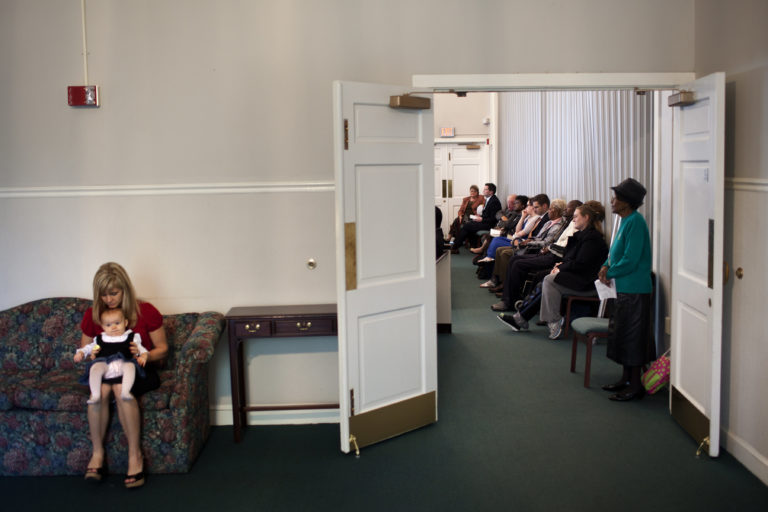
Image by Brendan Smialowski.
American Culture Just Shifted a Bit
In American religious life, something interesting just happened. Last week, leaders of The Church of Jesus Christ of Latter-day Saints, long viewed as opponents of gay rights, publicly opened a dialogue about how to balance needed expansion of legal protections for gays and lesbians with reasonable exemptions intended to protect religious freedom. American culture just shifted a bit.
Some of the instant reactions to the news seemed to come right out of the Culture War Handbook. On one side, prominent gay-rights leaders voiced skepticism. The Human Rights Campaign called the LDS Church’s new stance “deeply flawed.” On Twitter, Evan Wolfson of Freedom to Marry — a man I know and respect — called the church’s statement a “nod” toward nondiscrimination, but worried that religious exemptions can be “licenses to discriminate.”
Retired Episcopalian Bishop Gene Robinson’s op-ed on the announcement was titled, “Dear Mormons: Thanks But No Thanks.”
On the other side, prominent religious conservatives also voiced skepticism. Russell Moore of the Southern Baptist’s Ethics and Religious Liberty Commission called the Mormon position “well-intentioned, but naïve.” He argued that legal protections for gays and lesbians “inevitably lead to targeted assaults on religious liberty” and announced with satisfaction that the LDS Church statement was generally greeted by “disappointment from social conservatives.”
But I don’t like the Culture War Handbook, and for that reason alone, I believe that the LDS Church must be doing something right here. Yes, some advocates seem determined to use the cause of religious liberty to justify blatant discrimination. And yes, other advocates insist that any and all exemptions from nondiscrimination laws are illegitimate. But this kind of no-compromise, winner-take-all culture war is not the only possibility. I’m not a Mormon, and I have no special knowledge of LDS Church leaders’ motives on this issue. But I was struck, and deeply encouraged, by three aspects of last week’s announcement.
First, the church is clearly seeking to do more to recognize and respect gay and lesbian people and families. To me, that’s morally right. Is it everything that gays and lesbians want? No. Is it a good step to take? Yes.
Second, the LDS leaders are clearly advocating a model of engagement in which both sides get something of value. Gays and lesbians gain a more welcoming church and new statewide legal protections. (Remember, in a majority of U.S. states, there are no laws protecting citizens from discrimination on the basis of sexual orientation in fundamental areas such as housing, public accommodations, and employment.) Houses of worship gain protection from coercion by the state in matters of conscience and religious practice. (Remember, many churches fear that they could face public or private lawsuits or the loss of their tax-exempt status by, for example, refusing to host weddings to which they object on religious grounds.) Such a model of engagement, done in the right spirit, makes it possible for both sides to win — and in the process show that diverse groups of Americans can find creative ways to live together.
How important is this LDS-backed approach in the current political climate? In recent months, in a number of states where there are currently no legal protections for gays and lesbians, religious-liberty advocates worried about gay rights have forged ahead anyway, often with proposals that are quite extreme.
Last year in Kansas, for example, a proposed bill — it did not pass — would have extended the right of religious objection from religious organizations themselves to every private individual and business in the state, raising troubling issues of basic fair treatment. It would have protected religious objections not only to gay marriage, but also to “similar” arrangements. The bill also specified that religious objections to gay unions in Kansas always win, regardless of the burdens placed on same-sex couples. My home state of Mississippi recently passed a very similar bill. If you look up “religious freedom” in the Culture War Handbook today, this is what you’ll find. It’s ugly and one-sided and unfair. What the LDS leaders are proposing is a welcome departure from this recent pattern.
Finally, there’s the question of tone. In the Culture War Handbook, we’re taught that the correct tone is anger. We’re fed up, and we’re not taking it anymore. We’re offended by the brazen behavior of our opponents, who are acting in bad faith. This is a battle, and we’re going to win it!
Last week the LDS leaders ignored the Handbook. They argued for what they called a “fairness for all” approach, which might help to “overcome the sharp divisions and present cultural divide in our nation.” They called for a “mutually respectful dialogue” in which “neither side may get all that they want.”
The editors and students of the Culture War Handbook are unhappy over this surprising turn of events. But I’m not.
Mr. Blankenhorn’s commentary was first published by the Deseret News and reprinted with permission.
